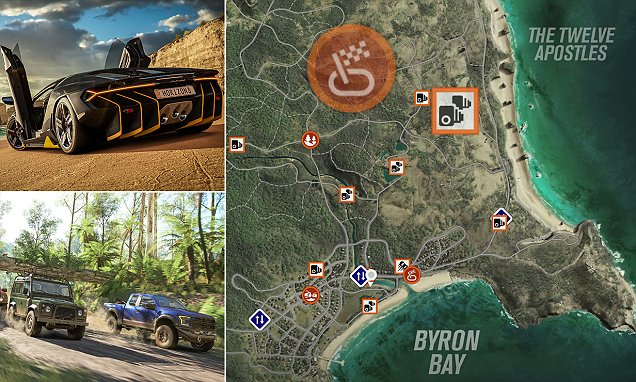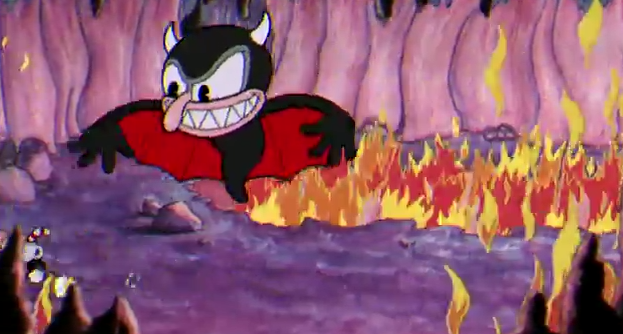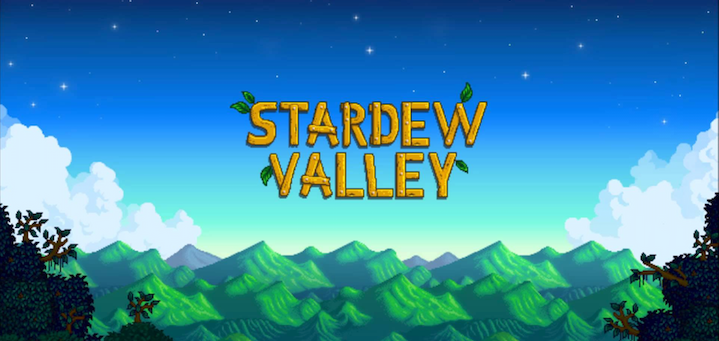Warning: This post does contain spoilers for the game. You may want to read it only if you don’t mind spoilers or if you have already played the episode.
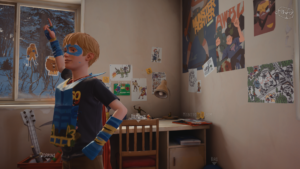
I first saw the trailer for The Awesome Adventures of Captain Spirit shortly after its E3 debut. It looked cute and interesting and the fact that it was free were all pluses. Then I saw that it took place in the same universe as Life is Strange, one of my favorite video games and I knew I had to play it. It is a very short experience but one that is definitely worth playing – especially if you are a fan of Life is Strange and if you are planning on playing the recently announced sequel. Though, be warned. This game, short as it may be (keep in minds it’s FREE), still packs an emotional punch and easily carries on the legacy of Life is Strange’s heavy themes and tenuous emotional choices.
In this minisode (as some people are calling it) you play as Chris, a young boy with a wildly vivid imagination. You quickly learn that he loves to play, read comic books, draw, and is excited about Christmas which is quickly approaching. Unlike his father he is not very good at sports, yet is highly energetic and loves to write stories. Unfortunately, Chris’s life is not as bright and happy as the frivolous and innocent intro leads you to believe.
In the first ten minutes as you are exploring his bedroom on a lazy Saturday afternoon, you start to notice small things: Chris mentions that his father has not fixed his gaming system like he said he would a month ago. He points out a flyer about one of his favorite comic book events that he missed because his father “had to watch the game”. Then, if you’re like me and want to explore everything, you ignore Chris’s father when he calls out to you. You ignore him one more time as you try to look at all the posters, action figures, and rummage through the closet. Then he really yells and cusses at you. When you exit the room he says something snappy using foul language. As you sit down for breakfast you notice the already 3 empty beer cans next to the stove. The camera then angles to show bruises on Chris’s arms when his father asks if anyone else has asked about them and then subtly blames Chris for them.
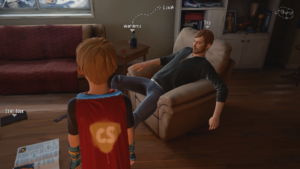 What quickly unfolds is a tragic story overlaid by both the imaginative and real perils of a young boy in a broken household. If they search around enough, players’ discover that Chris’s mother was killed. His father, fallen from his glory days as a basketball star, spirals into alcoholism and abuse. Though Chris seems to be handling things “well” you can see that the imaginative monsters he fights throughout the game are manifestation and personifications of the demons he must battle in real life. Though most of the story unfolds in the background there are still some very emotional moments.
What quickly unfolds is a tragic story overlaid by both the imaginative and real perils of a young boy in a broken household. If they search around enough, players’ discover that Chris’s mother was killed. His father, fallen from his glory days as a basketball star, spirals into alcoholism and abuse. Though Chris seems to be handling things “well” you can see that the imaginative monsters he fights throughout the game are manifestation and personifications of the demons he must battle in real life. Though most of the story unfolds in the background there are still some very emotional moments.
After I found out how bad Chris’s father’s alcoholism was and after discovering the bruises on his arm it was very stressful to decide what to do and say around his father, especially if options involved getting in the father’s way or addressing the alcohol. I didn’t want Chris get hurt. Sometimes things turned out fine and yet other times his father’s anger surfaced. Another emotional moment involved Chris finding his “hidden treasure”, a stash of pictures and mementos of his mom and of his family before. He starts get red in the eyes then starts to silently cry as he explains how much he misses her and how beautiful she was. Cue real tears.
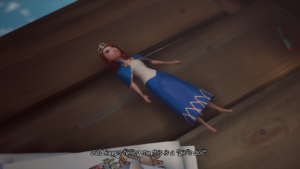
Something else the game addresses that I was pleasantly surprised by were gender stereotypes as they relate to children and how our culture tries to force and define these stereotypes into their way of thinking. Early in the game while searching through Chris dvds he states how he loves Frozen and how he sang loudly to all of the songs. Later when Chris goes to his tree house you see a Frozen doll. When you examine it he states that his dad thinks it’s a “girls doll”. To which he also responds, “So what? She’s the Ice Queen!”, illustrating the fact that this is a character Chris likes and looks up to, just like his other superheroes. He views the doll as what it should be – a toy to play with to harness a child’s imagination, not an embodiment of professed femininity vs masculinity that supposedly “antagonizes” our cultures enforced gendered norms.
As aforementioned, Chris also loves writing and drawing. I don’t see to many drawings by children but he seems to be very good for someone his age. In this way Chris and the developers try to normalize gender as a complex construct and try not to ascribe certain ideas or things as binary hues of “pink” and “blue”. Chris, though a child, is still a person of complex interests, much like many of us actually are. Chris loves drawing and playing outside. He loves video games and writing stories. He loves Frozen and the superhero Power Bear. To him these are not “boy” or “girl” things, just things he likes.
Overall, this was a surprisingly impactful and creatively crafted minisode that stands apart yet easily carries the legacy of

Life is Strange. The cinematic shots and quickly complex story make it an intriguing hour or two that I look forward to learning more about. In terms of the sequel and how this specific story ties into it and how necessary the knowledge you gain from Chris’s story will be for the continuing saga will be is unknown. At the end of the game you are left with a slight cliffhanger that closes to a title card stating Chris will return in Life is Strange 2. Will he be the protagonist? The antagonist to the two other characters seen at the end? Will you be able to play all three? Not much is known, but I am excited to see more of Chris and what Life is Strange 2 has in store.

